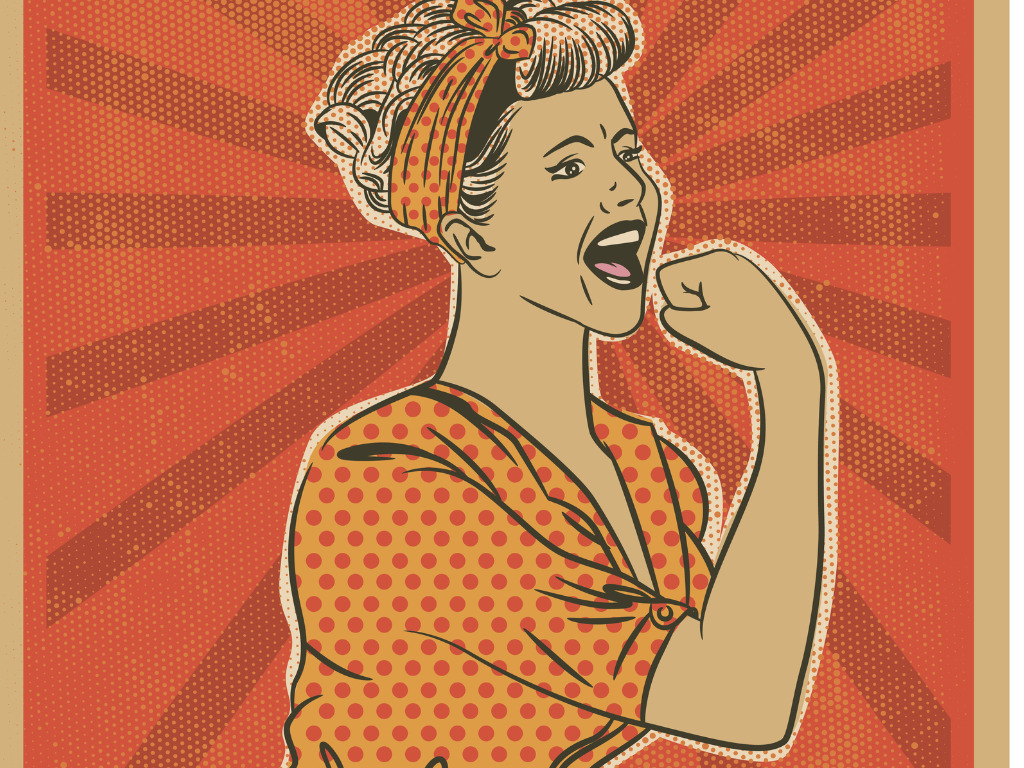I first knew I was a feminist in the front seat of my mother’s Honda Odyssey. We were driving somewhere in New York City. I don’t remember what the conversation had been earlier, but I do remember saying, “I don’t think I’m a feminist.”
I give my mother a lot of credit for not losing her cool as she proceeded to ask me three questions that determined I believed in the political, social, and economic equality of women to men. It must have been a weird moment for her as a Jewish feminist to have to actively teach her daughter something so core to who she was and still is.
Since then, my feminism has grown, evolved, and morphed into something that I still don’t quite understand. It is common sense to me, yet there are certain situations where I find my opinions airing on the side of tradition, of how it’s always been done.
As a girl growing up in the Orthodox bubble of Teaneck, New Jersey, I was blessed with a cadre of strong women who still play an important role in my life. They are my mother’s best friends who have been through hell and back and still manage to laugh over Shabbos morning coffee. They are my babysitters and pseudo-sisters who obviously went to Israel after high school to engage in serious Torah study. They are the learned leaders who taught me how to read and understand a page of Talmud, how to write an essay about The Scarlet Letter using the words of Rav Soloveitchik, and how to teach others with love, compassion, and humor.
These women taught me that I can wear jeans and still believe in the divinity of Torah and halakha. These women showed me that I can—and should— respond to kaddish and kedusha loudly and clearly, even when others merely whisper. These women struggled to wrap their minds around a feminist Orthodoxy in ways I will never have to, specifically because they fought the good fight before I was born. For that, I am grateful, and also resentful.
I am resentful towards women I know and love even though I know that they are not perfect, that they are flawed. They are not giants, but regular-sized humans. Sometimes I get into raging fights with them about the nature of spaces segregated by sex. Sometimes I don’t want to ask a halachic question of a given teacher relating to my relationship because I know I won’t like the answer. Sometimes these women I love are not radical enough in their Orthodoxy for me. Sometimes it’s that their feminism outweighs their love of God.
But sometimes it’s because I realize they don’t have the answers. They don’t know how to help me reconcile the parts of me that are at war. The parts of me that love Talmud and nail polish, the parts of me that hate when female Torah scholars are not given the credit they are due, and that hate feeling judged when I decide not to shave a given body part. They don’t know how to tell me that there will never be answers.
I will always feel anger bubbling in my lungs as a thirteen-year-old boy is called to the Torah in front of the whole community, as I sit behind a latticework wall following along with a newly manicured finger.
I will always feel small when, at the Shabbos table, my father is able to out-learn me as he stands on one proverbial foot, even though he hasn’t been in yeshiva for years, even though I had just gotten back from midrasha.
I will always hate the things I cannot change, the things that convince me we are headed backwards. I will boil with rage at institutions that refuse to hire women as clergy, despite their dedication to the Jewish people. I will cry outside the shul on Tikkun Leil Shavuot when a well-meaning rabbi says “we all are part of the covenant through brit milah, just like we all received the Torah at Sinai,” because I will feel that the Torah was not written for me.
And yet:
I will always feel moved on Purim, when I am able to read about how Esther donned her royalty to save her people, the archetype of a female leader who used her quiet power to fight for what was right. I will tear up as I remember how shaky my sing-song was as a barely bat-mitzvahed sixth grader, but I will continue to chant in a loud, clear voice.
I will always get an adrenaline rush over scanning texts to find that puzzle piece source that will make my lesson fall into its perfect place, so that I can reinterpret Torah to mean what I think will best help my students love Judaism and God, while still acknowledging that there are parts of our tradition that we would not write ourselves.
I will always love the things that make my heart soar on the wings of the Shekhina. I will cry hot, happy tears as I watch qualified, dignified, and just plain awesome women receive semikha. I will grin with pride as girls I babysat volunteer their summers to studying Torah, as they find their voices, as they steer the conversation forward.
I will always attempt to reconcile my feminism and my Judaism without entirely understanding how or why I bother. I will always feel simultaneously torn and whole as I feel the push and pull of the two traditions I could never want to choose between.





